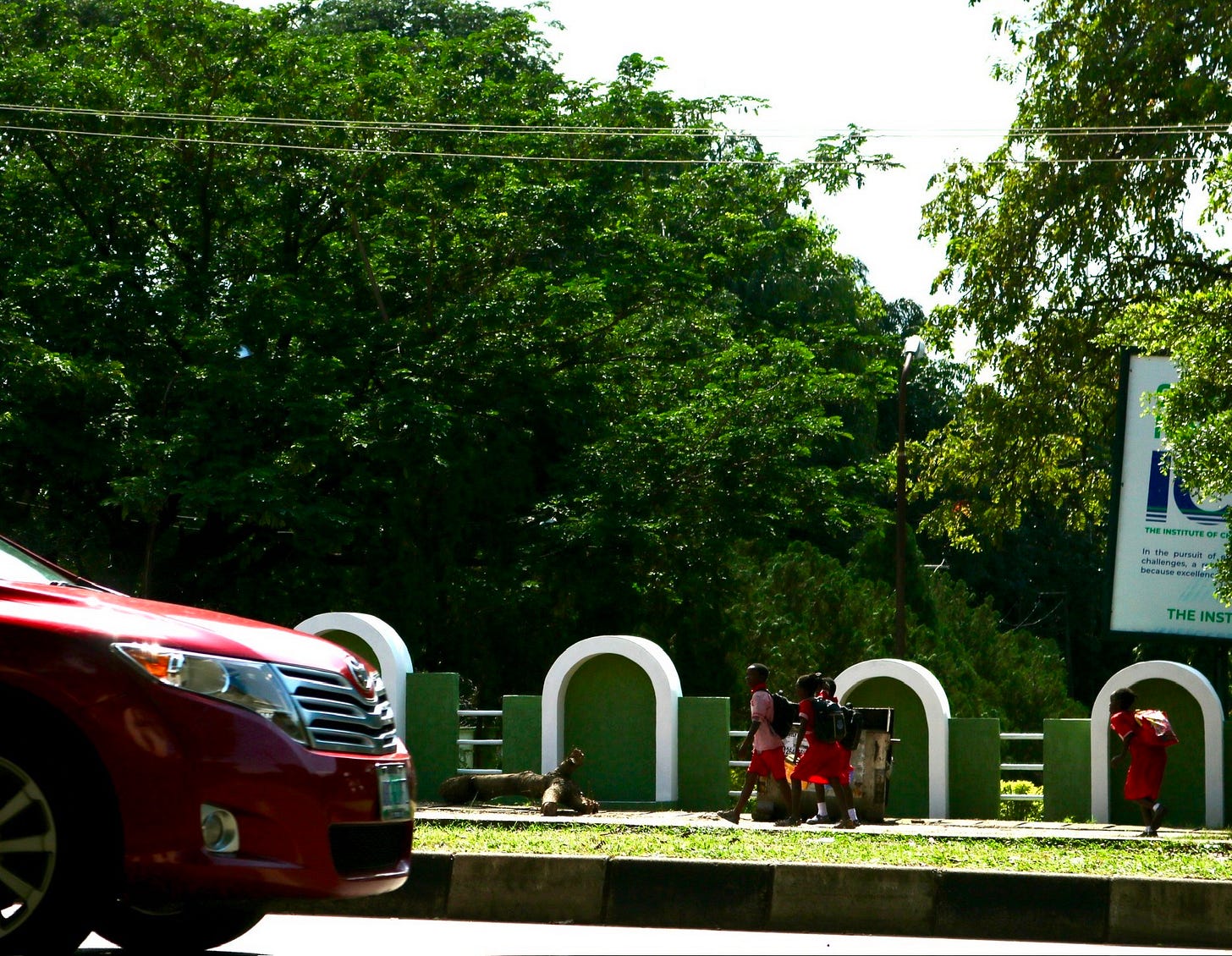One reason why Nigerian students are apathetic about Nigeria
Including some notes about 'Native Afropessimism'
I wrote this piece in December 2022, three years ago hence before I started Caped Corners. Forgot about it till a conversation with a friend last week.
They parade the scorching suburbs of Nigeria's capital wielding their dainty tools – long rod with a brush screwed at one end and a bottle of foamy water. While the rest of the city races past, our little heroes remain optimistic, hoping that one oncoming vehicle will stop, yield, and allow them to clean their windshield. Most folks will sneer, drive past, or even drive at them; few will offer whatever spare change they garnered from their shopping trip. For our street surfers, this is their livelihood: after school till sunset, throughout the weekends, and during school breaks.
While their distressing realities are apparent to every dweller in the state – including politicians and people of influence – there has been little concerted effort to mitigate the situation. We have become blind to their suffering and, even worse, rendered the problem the norm–throwing our faces away at their scorn and treating them like road obstacles. Crucially, this raging resignation is not limited to this situation; It is one of the manifestations of a larger, more consequential ideology that there can be no redemption for the country.
Some western scholars have categorised this similar, rising essentialisation of black oppression as afropessimism: the argument that black solidarity is a futile cause for non-blacks. While these theories don't adequately address the pessimism of one's people towards themselves, they help conceptualise the phenomenon manifesting in my country. One of these fundamentals, posited by Annie Olaloku Teriba, is that the "increased disconnection from the intellectual history of the last period of anti-colonial insurgency" is responsible for the corrupt development of afropessimism ideologies. Teriba argues that the erasure of black triumph fosters anti-blackness and enables these gloomy modern rewrites. This synopsis can also be ascribed to the situation in my home nation: what I would like to call native-afropessimism.
My year-long soul searching – investigating this conception – led me to 2009, when Nigeria removed history from the national education curriculum, specifically in primary and junior secondary schools. Between then and 2019, millions of schoolchildren graduated from high school without receiving any tailored instruction about Nigeria's pre-colonial history, the struggle for independence, and early post-colonial achievements. This self-inflicted damage, which Wole Soyinka, Nigerian Nobel Laureate, describes as "a crime…done to our children and our advancement," deprived millions of kids from grounding their nationality on our forefather's centuries of achievements.
There was no 'collective memory' for my generation to look up to. Instead, the damning realities of the nation – inflation, poverty, scarcity, and a dearth of empathy – were the prevailing narratives upon which our values were built.
Therefore, it is unsurprising that during a brief survey of my graduating class last week, the consensus was that there was no hope for the country. Only two persons were registered voters despite the country holding one of its most important elections in a few months. My mates celebrate leaving the country, not because of the possibility of acquiring valuable education for the continent, but because they can flee from it. We've been desensitised to the pains and struggles of our own people and, with no core to fall back on, are in danger of spurring an endemic apathy.
Just as one policy change worsened this reality, we have an ever-slipping chance to reverse-engineer it. A concerted effort to sensitise our generation to the impact of local initiatives will stimulate multi-pronged, people-oriented solutions across Africa. Now, more than ever, we need to amplify our stories and achievements. The continent is desperate for deliberate and reliable reportage tailored to the people. Because, while several folks are doing great things in the nation and on the continent, our ingrained biases have clouded sincere acknowledgement.
Finally, during one of my street-photography runs last month, I stumbled across a 7-year-old boy called Malik. Unlike the earlier described little heroes, his implements were uncharacteristically recklessly tossed across the stony sidewalk. His head was submerged in his hands, and tears streamed through the slits between his fingers. I hurriedly stopped and stooped over to inquire what was wrong before his bloodshot, bold eyes pierced through my heart: someone had forcefully taken his earnings for the day and rendered him penniless.
"I cannot go back home," he cried. "What will I tell my mother?"
I am committed to giving folks like Malik renewed optimism – a reminder that the country cares.
This essay ended up being the spark for starting this blog, Caped Corners, where I intended to tell shelved, untold stories of struggle and, in some cases, triumph.


Great insight and very well written.
Nigerians need to feel one with Nigeria and sincerely believe that Nigerians can succeed in Nigeria and can make it better for future generations and themselves. Hope and a better future is possible should be a core belief. This "brain drain" (best talent leaving for abroad) phenomenon is suffered by a lot of developing countries including India.